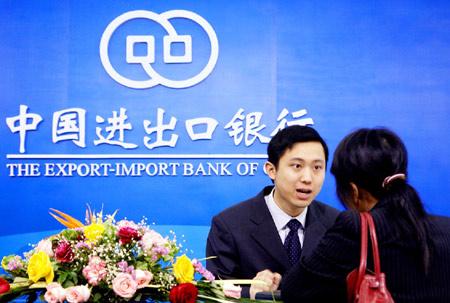
An Export-Import Bank of China employee speaks to a woman at an exhibition in Zhengzhou, Henan province. [China Daily]
Proceeds from $11.7b issue to be injected into policy-oriented institutions
BEIJING - Central Huijin Investment Co, the domestic investment arm of China's sovereign wealth fund, will start to sell bonds worth 80 billion yuan ($11.73 billion) as early as next month and will inject the proceeds into two policy-oriented financial institutions, a source close to the matter said on Thursday.
Five brokerages including Citic Securities, China's largest by market value, have been selected to underwrite the bond sale, the source said.
Central Huijin, as sources earlier told China Daily, will use the proceeds for capital injections into Export-Import Bank of China (China Eximbank) and China Export & Credit Insurance Corp (Sinosure) to help strengthen their capital base.
The move is widely seen as an effort by policymakers to promote the restructuring of China Eximbank and Sinosure in order to bolster support for Chinese exporters and importers amid the uncertain global economic outlook.
China Eximbank, founded in 1994, is a policy-oriented bank, which provides financing to Chinese exporters and importers. Sinosure was founded in 2001 to provide export credit insurance to Chinese exporters.
The two financial institutions have been facing mounting risks from non-performing loans and are in dire need of cash to replenish their capital base. Market watchers said the cash injection from Central Huijin will help consolidate their policy-oriented business and clear bad loans from their balance sheets.
China Eximbank had 792.1 billion yuan in assets and 781.9 billion yuan of debt at the end of 2009, according to its annual report. The lender reported a net profit of 2.5 billion yuan in 2009, a 14 percent rise year-on-year.
Sinosure sold 781.2 billion yuan of export credit insurance in 2009, an 85.8 percent increase year-on-year, according to the company. The State-owned insurance company suffered losses in 2008 due to a surge in claims, which significantly weakened its capital.
The financial bonds issued by Central Huijin would be priced at a rate lower than those issued by commercial banks, but higher than policy financial bonds, according to analysts.
Market watchers, however, are not exactly upbeat about the earning prospects of Central Huijin's bond issue, as domestic banks will face mounting bad loan risks in the coming years after the lending spree of 2009.
Central Huijin, parent of Industrial and Commercial Bank of China, Bank of China and China Construction Bank, recently said that it would participate in the fundraising of the country's top three banks to help replenish their capital base.





